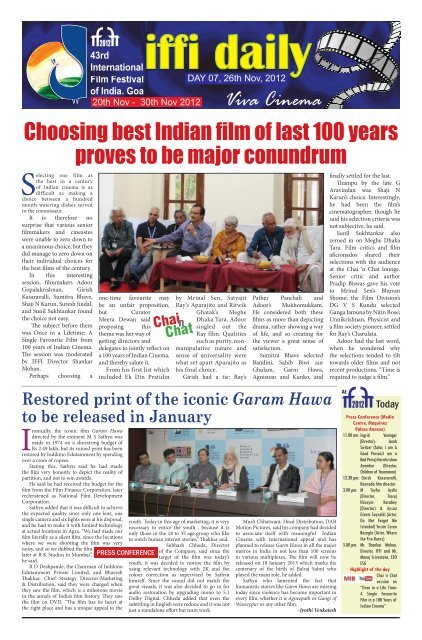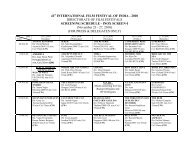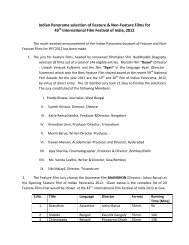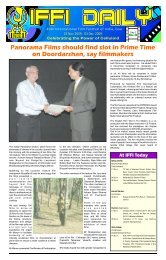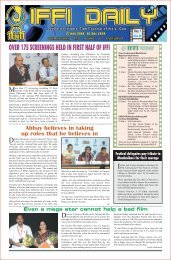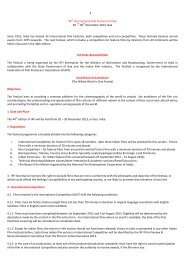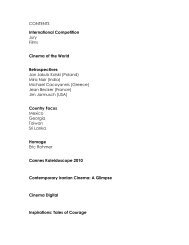IFFI Bulletin - 26 th November - International Film Festival of India
IFFI Bulletin - 26 th November - International Film Festival of India
IFFI Bulletin - 26 th November - International Film Festival of India
You also want an ePaper? Increase the reach of your titles
YUMPU automatically turns print PDFs into web optimized ePapers that Google loves.
Choosing best <strong>India</strong>n film <strong>of</strong> last 100 years<br />
proves to be major conundrum<br />
Selecting one film as<br />
<strong>th</strong>e best in a century<br />
<strong>of</strong> <strong>India</strong>n cinema is as<br />
difficult as making a<br />
choice between a hundred<br />
mou<strong>th</strong>-watering dishes served<br />
to <strong>th</strong>e connoisseur.<br />
It is <strong>th</strong>erefore no<br />
surprise <strong>th</strong>at various senior<br />
filmmakers and cineastes<br />
were unable to zero down to<br />
a unanimous choice, but <strong>th</strong>ey<br />
did manage to zero down on<br />
<strong>th</strong>eir individual choices for<br />
<strong>th</strong>e best films <strong>of</strong> <strong>th</strong>e century.<br />
In <strong>th</strong>is interesting<br />
session, filmmakers Adoor<br />
Gopalakrishnan, Girish<br />
Kasaravalli, Sumitra Bhave,<br />
Shaji N Karun, Suresh Jindal,<br />
and Sunil Sukhtankar found<br />
<strong>th</strong>e choice not easy.<br />
The subject before <strong>th</strong>em<br />
was Once in a Lifetime: A<br />
Single Favourite <strong>Film</strong> from<br />
100 years <strong>of</strong> <strong>India</strong>n Cinema.<br />
The session was moderated<br />
by <strong>IFFI</strong> Director Shankar<br />
Mohan.<br />
Perhaps choosing a<br />
Restored print <strong>of</strong> <strong>th</strong>e iconic Garam Hawa<br />
to be released in January<br />
Ironically, <strong>th</strong>e iconic film Garam Hawa<br />
directed by <strong>th</strong>e eminent M S Sa<strong>th</strong>yu was<br />
made in 1974 on a shoestring budget <strong>of</strong><br />
Rs 2.49 lakh, but its ruined print has been<br />
restored by Indikino Edutainment by spending<br />
over a crore <strong>of</strong> rupees.<br />
Stating <strong>th</strong>is, Sa<strong>th</strong>yu said he had made<br />
<strong>th</strong>e film very honestly to depict <strong>th</strong>e reality <strong>of</strong><br />
partition, and not to win awards.<br />
He said he had received <strong>th</strong>e budget for <strong>th</strong>e<br />
film from <strong>th</strong>e <strong>Film</strong> Finance Corporation, later<br />
rechristened as National <strong>Film</strong> Development<br />
Corporation.<br />
Sa<strong>th</strong>yu added <strong>th</strong>at it was difficult to achieve<br />
<strong>th</strong>e expected quality since only one lens, one<br />
single camera and six lights were at his disposal,<br />
and he had to make it wi<strong>th</strong> limited technology<br />
at actual locations in Agra. “We had made our<br />
film literally as a silent film, since <strong>th</strong>e locations<br />
where we were shooting <strong>th</strong>e film was very<br />
noisy, and so we dubbed <strong>th</strong>e film<br />
later at R K Studios in Mumbai”,<br />
he said.<br />
R D Deshpande, <strong>th</strong>e Chairman <strong>of</strong> Indikino<br />
Edutainment Private Limited, and Bhavesh<br />
Thakkar, Chief Strategy Director-Marketing<br />
& Distribution, said <strong>th</strong>ey were charged when<br />
<strong>th</strong>ey saw <strong>th</strong>e film, which is a milestone movie<br />
in <strong>th</strong>e annals <strong>of</strong> <strong>India</strong>’s film history. They saw<br />
<strong>th</strong>e film on DVD. “The film has its heart at<br />
<strong>th</strong>e right place and has a unique appeal to <strong>th</strong>e<br />
one-time favourite may<br />
be an unfair proposition,<br />
but Curator<br />
Meera Dewan said<br />
proposing <strong>th</strong>is<br />
<strong>th</strong>eme was her way <strong>of</strong><br />
getting directors and<br />
delegates to jointly reflect on<br />
a 100 years <strong>of</strong> <strong>India</strong>n Cinema,<br />
and <strong>th</strong>ereby salute it.<br />
From his first list which<br />
included Ek Din Pratidin<br />
PRESS CONFERENCE<br />
by Mrinal Sen, Satyajit<br />
Ray’s Aparajito and Ritwik<br />
Ghatak’s Meghe<br />
Dhaka Tara, Adoor<br />
singled out <strong>th</strong>e<br />
Ray film. Qualities<br />
such as purity, nonmanipulative<br />
nature and<br />
sense <strong>of</strong> universality were<br />
what set apart Aparajito as<br />
his final choice.<br />
Girish had a tie: Ray’s<br />
you<strong>th</strong>. Today in <strong>th</strong>is age <strong>of</strong> marketing, it is very<br />
necessary to entice <strong>th</strong>e you<strong>th</strong> , because it is<br />
only <strong>th</strong>ose in <strong>th</strong>e 18 to 35 age group who like<br />
to watch human interest stories,” Thakkar said.<br />
Subhash Chheda, Director<br />
<strong>of</strong> <strong>th</strong>e Company, said since <strong>th</strong>e<br />
target <strong>of</strong> <strong>th</strong>e film was today’s<br />
you<strong>th</strong>, it was decided to restore <strong>th</strong>e film by<br />
using relevant technology wi<strong>th</strong> 2K and <strong>th</strong>e<br />
colour correction as supervised by Sa<strong>th</strong>yu<br />
himself. Since <strong>th</strong>e sound did not match <strong>th</strong>e<br />
great visuals, it was also decided to go in for<br />
audio restoration by upgrading mono to 5.1<br />
Dolby Digital. Chheda added <strong>th</strong>at even <strong>th</strong>e<br />
subtitling in English were redone and it was not<br />
just a standalone effort but team work.<br />
Pa<strong>th</strong>er Panchali and<br />
Adoor’s Mukhomukkam.<br />
He considered bo<strong>th</strong> <strong>th</strong>ese<br />
films as more <strong>th</strong>an depicting<br />
drama, ra<strong>th</strong>er showing a way<br />
<strong>of</strong> life, and so creating for<br />
<strong>th</strong>e viewer a great sense <strong>of</strong><br />
satisfaction.<br />
Sumitra Bhave selected<br />
Bandini, Sahib Biwi aur<br />
Ghulam, Garm Hawa,<br />
Agnisnan and Kunko, and<br />
Murli Chhatwani, Head Distribution, DAR<br />
Motion Pictures, said his company had decided<br />
to associate itself wi<strong>th</strong> meaningful <strong>India</strong>n<br />
Cinema wi<strong>th</strong> <strong>International</strong> appeal and has<br />
planned to release Garm Hawa in all <strong>th</strong>e major<br />
metros in <strong>India</strong> in not less <strong>th</strong>an 100 screens<br />
in various multiplexes. The film will now be<br />
released on 18 January 2013 which marks <strong>th</strong>e<br />
centenary <strong>of</strong> <strong>th</strong>e bir<strong>th</strong> <strong>of</strong> Balraj Sahni who<br />
played <strong>th</strong>e main role, he added.<br />
Sa<strong>th</strong>yu who lamented <strong>th</strong>e fact <strong>th</strong>at<br />
humanistic stories like Garm Hawa are missing<br />
today since violence has become important in<br />
every film, whe<strong>th</strong>er it is Agneepa<strong>th</strong> or Gangs <strong>of</strong><br />
Wasseypur or any o<strong>th</strong>er film.<br />
-Jyo<strong>th</strong>i Venkatesh<br />
finally settled for <strong>th</strong>e last.<br />
Thampu by <strong>th</strong>e late G<br />
Aravindan was Shaji N<br />
Karun’s choice. Interestingly,<br />
he had been <strong>th</strong>e film’s<br />
cinematographer, <strong>th</strong>ough he<br />
said his selection criteria was<br />
not subjective, he said.<br />
Sunil Sukhtankar also<br />
zeroed in on Meghe Dhaka<br />
Tara. <strong>Film</strong> critics and film<br />
aficionados shared <strong>th</strong>eir<br />
selections wi<strong>th</strong> <strong>th</strong>e audience<br />
at <strong>th</strong>e Chai ‘n Chat lounge.<br />
Senior critic and au<strong>th</strong>or<br />
Pradip Biswas gave his vote<br />
to Mrinal Sen’s Bhuvan<br />
Shome; <strong>th</strong>e <strong>Film</strong> Division’s<br />
DG V S Kundu selected<br />
Ganga Jamuna by Nitin Bose;<br />
Unnikrishnan, Physicist and<br />
a film society pioneer, settled<br />
for Ray’s Charulata.<br />
Adoor had <strong>th</strong>e last word,<br />
when he wondered why<br />
<strong>th</strong>e selections tended to tilt<br />
towards older films and not<br />
recent productions. “Time is<br />
required to judge a film.”<br />
At<br />
Today<br />
Press Conference (Media<br />
Centre, Maquinez<br />
Palace Annexe)<br />
11.00 am: Ingrid Veninger<br />
(Director); Jacob<br />
Switzer (Actor, I am A<br />
Good Person/I am a<br />
Bad Perso) Harrikrishna<br />
Anenden (Director,<br />
Children <strong>of</strong> Troumaron)<br />
12.30 pm: Girish Kasaravalli,<br />
Kannada film director<br />
3.00 pm: M Tayfur Aydin<br />
(Director, Trace)<br />
Hüseyin Karabey<br />
(Director) & Aysun<br />
Gizem Soysaldi (Actor,<br />
Do Not Forget Me<br />
Istanbul) Yesim Ceren<br />
Bozoglu (Actor, Where<br />
<strong>th</strong>e Fire Burns)<br />
5.00 pm: Mr. Shankar Mohan,<br />
Director, <strong>IFFI</strong> and Mr.<br />
Manoj Srivastava, CEO<br />
ESG<br />
Highlight <strong>of</strong> <strong>th</strong>e day<br />
Chai ‘n Chat<br />
session on<br />
“Once in a Life Time:<br />
A Single Favourite<br />
<strong>Film</strong> in a 100 Years <strong>of</strong><br />
<strong>India</strong>n Cinema”
02 <strong>IFFI</strong> | <strong>November</strong> <strong>26</strong>, 2012 SCREENING SCHEDULE<br />
<strong>26</strong><strong>th</strong> <strong>November</strong> 2012<br />
Susanne Bier hopes to find good stories<br />
in <strong>India</strong> for co-production ventures<br />
My first job as a filmmaker is<br />
to not make a boring film. I<br />
don’t see a conflict between<br />
art and commerce, but I do<br />
see one between boredom and commerce.”<br />
Susanne Bier, <strong>th</strong>e Danish director/<br />
screenwriter whose Retrospective is being<br />
held at <strong>IFFI</strong>, could not have been more<br />
accurate about understanding <strong>th</strong>e pulse <strong>of</strong><br />
<strong>th</strong>e viewers.<br />
Two years after she bagged <strong>th</strong>e Best<br />
Director award for ‘In a Better World’ at<br />
<strong>IFFI</strong> Goa in 2010 – an award collected<br />
by her son as he could not make it, she<br />
is being honoured again wi<strong>th</strong> a six-film<br />
retrospective. In a Better World had gone<br />
on to win <strong>th</strong>e Golden Globe in 2011.<br />
Born in 19670, Susanne Bier grew<br />
up in Copenhagen. She studied art at<br />
<strong>th</strong>e Hebrew University in Jerusalem,<br />
and architecture at <strong>th</strong>e Architectural<br />
Association in London, before graduating<br />
from <strong>th</strong>e Danish <strong>Film</strong> School in 1987. Her<br />
graduation film won first prize at <strong>th</strong>e film<br />
school festival in Munich, after which<br />
she got <strong>th</strong>e opportunity to direct her first<br />
feature film, Freud’s Leaving Home (1991).<br />
Like It Never Was Before, made four<br />
years later, is <strong>th</strong>e sensitive story <strong>of</strong> a<br />
middle-aged, mild mannered married<br />
Susanne Bier,<br />
man who’s just been passed over for a<br />
promotion.<br />
In 1997 Bier directed <strong>th</strong>e psychological<br />
<strong>th</strong>riller Credo, and in 1999, she made <strong>th</strong>e<br />
romantic comedy The One and Only/<br />
The Only One, which was a big box-<strong>of</strong>fice<br />
hit-- more <strong>th</strong>an 850,000 filmgoers, out <strong>of</strong><br />
<strong>th</strong>e 5.5 million population <strong>of</strong> Denmark,<br />
watched <strong>th</strong>is film.<br />
Susanne achieved a notable<br />
international break<strong>th</strong>rough in 2002, wi<strong>th</strong><br />
<strong>th</strong>e Danish Dogma film Open Hearts,<br />
which tells <strong>th</strong>e story <strong>of</strong> two couples, whose<br />
lives are destroyed by a car accident.<br />
Bier received various awards for <strong>th</strong>e<br />
film, including <strong>th</strong>e <strong>International</strong> Critics<br />
Award at Toronto <strong>Film</strong> <strong>Festival</strong>, where<br />
<strong>th</strong>e citation read, Open Hearts proves <strong>th</strong>at<br />
Dogma has come <strong>of</strong> age and matured into<br />
a potent cinematic language <strong>th</strong>at skillfully<br />
captures <strong>th</strong>e freeing <strong>of</strong> real emotions <strong>th</strong>at<br />
extreme trauma creates wi<strong>th</strong>in <strong>th</strong>e lives <strong>of</strong><br />
<strong>th</strong>e characters in her film.<br />
Apart from Open Hearts, Bro<strong>th</strong>ers<br />
(2004) which received <strong>th</strong>e Audience<br />
Award at Sundance and Best Acting<br />
awards at San Sebastian, After <strong>th</strong>e<br />
Wedding (2006) which was nominated for<br />
an Academy Award are also being shown<br />
in <strong>th</strong>is retrospective. In <strong>th</strong>e latter, Mads<br />
Mikkelson (<strong>th</strong>e villain <strong>of</strong> <strong>th</strong>e James Bond<br />
film Casino Royale) plays Jacob, an earnest<br />
man, a teacher and manager <strong>of</strong> a school for<br />
orphaned boys in <strong>India</strong>, who reluctantly<br />
returns to Denmark when a prospective<br />
donor <strong>of</strong>fers significant funding. But <strong>th</strong>e<br />
<strong>of</strong>fer is not as philan<strong>th</strong>ropic as it seems.<br />
Highly awarded for her films, Susanne<br />
says <strong>th</strong>e awards only open windows but do<br />
not change her life o<strong>th</strong>erwise.<br />
Interestingly, she is scouting for<br />
good <strong>India</strong>n stories to be filmed as coproduction<br />
ventures.<br />
Susanne Bier has two children Gabriel<br />
Bier Gislason (aged 23) and Alice Es<strong>th</strong>er<br />
Zanden Bier (17). Currently, she lives wi<strong>th</strong><br />
producer and composer Jesper Winge<br />
Leisner in Copenhagen. - Siraj Syed
<strong>IFFI</strong> | <strong>November</strong> <strong>26</strong>, 2012<br />
03<br />
^maVr` {gZo‘m Ho$ eVmãXr g‘mamoh H$m CËgd<br />
^maVr` {gZo‘m Ho$ gm¡<br />
gmb H$mo g‘{n©V Bâ’$s<br />
‘hmoËgd ‘| {XImB© J`r<br />
{’$ë‘m| H$s l¥§Ibm ‘| {nN>bo nm§M<br />
{XZm| ‘| {hÝXwñVmZr {’$ë‘m| Ho$ H«${‘H$<br />
{dH$mg `mÌm H$mo Xem©Vr à{V{Z{Y<br />
{’$ë‘m| H$m àXe©Z AË`§V àe§gZr`<br />
g§nÞ hþAm Bâ’$s ‘hmoËgd H$m AmYm gµ’$a<br />
Ed§ àr{VH$a ahm.<br />
ANy>V H$Ý`m, g§V VwH$mam‘,<br />
M§ÐboIm {’$ë‘m| H$m àXe©Z 43d|<br />
Bâ’$s g‘mamoh ‘| Am`o {gZo ào{‘`m|<br />
Ho$ {bE EH$ CnbpãY Ho$ ê$n ‘| {‘br<br />
gm¡JmV ahr. amOH$nya H$s Amdmam<br />
{hÝXwñVmZ H$s AmµOmXr Ho$ ~mX Ho$<br />
~XbVo gm‘m{OH$-nm[adm[aH$ gÝX^©<br />
H$mo Ohm§ EH$ Amoa aoIm§{H$V H$aVr h¡<br />
dhr± `h {’$ë‘ nhbr ~ma ^maVr`<br />
{gZo JrV-g§JrV H$m naM‘ Xw{Z`m<br />
^a ‘| bham J`r.<br />
gË`{OV ao {ZX}{eV {’$ë‘<br />
nmWoa nm§Mmbr H$s N>{d Ho$ gmW<br />
JwéXÎm H$s {’$ë‘ ß`mgm H$s ß`mg<br />
AmO ^r ~Zr hþ`r h¡. F$pËdH$ KQ>H$<br />
H$s {’$ë‘ ‘oKo T>mH$m Vmam O¡gr<br />
{’$ë‘ XeH$m| ‘| EH$ ~ma hr ~ZVr h¢.<br />
Ho$. Am{g’$ {ZX}{eV ‘wµJb-E-<br />
AmµO‘ AnZo a§JrZ H$boda ‘| {Og<br />
{ZIma Am¡a VmOJr H$mo g§Omo`o hþE<br />
AmJo AmB© h¡ CgZo bmoJm| H$mo AmO ^r<br />
M‘ËH¥$V H$a aIm h¡. am‘y H$[aAV H$s<br />
‘b`mb‘ {’$ë‘ Mo‘rZ H$s gamhZm<br />
Ho$ gmW ‘¥Umb goZ H$s ^wdZ emo‘o<br />
H$s à{g{Õ Am¡a ^r C‚db hþB© h¡.<br />
{ZX}eH$ nÅ>m{^ am‘m aoÈ>r H$s<br />
H$Þ‹S> {’$ë‘ gåñH$mam, ‘{U H$m¡b<br />
H$s Xw{dYm Am¡a E‘.Eg. gÏ`w {ZX}<br />
{eV Ja‘ hdm Ho$ gmW H$‘mb<br />
A‘amohr H$s nmH$sµOm {H$gr ’y$b na<br />
gw~h H$s Amog ~y§Xm| gr erVbVm Xo<br />
J`r. AnZo H$WmZH$, amOHw$‘ma Am¡a<br />
‘rZm Hw$‘mar Ho$ ~ohVarZ A{^Z`<br />
Ho$ gmW-gmW nmH$sµOm {’$ë‘ AnZo<br />
H$mbO`r JrV-g§JrV Ho$ {bE AmO<br />
^r {gZo B{Vhmg ‘| AnZm ˜mg<br />
ñWmZ aIVr h¡.<br />
Bâ’$s ‘hmoËgd Zo AnZo Xg<br />
{Xdgr` A§Vaamï´>s` CËgd H$s `mÌm<br />
H$m H$b AmYm n‹S>md g’$bVm nyd©H$<br />
nyam H$a {b`m h¡. ^maVr` {gZo‘m<br />
Ho$ gm¡ gmb Ho$ Bg {de<strong>of</strong> Am`moOZ<br />
H$m gwIX nhbm {hñgm nyU© hmo MwH$m<br />
h¡ na A~ AmO go àmaå^ hmo aho<br />
BgHo$ Xygao ^mJ H$s ^mJrXmar Am¡a<br />
^r gwÝXa ê$n ‘| H$B© Z`r VmOJr<br />
{bE àJQ> hmo ahr h¡. {gZo B{Vhmg<br />
H$s ‘hËdnyU© gm¡JmV {bE {’$ë‘m| H$m<br />
JwbXñVm Bg ‘hmoËgd Ho$ CÎmamÕ© ‘|<br />
h‘ g~ Ho$ gm‘Zo ‘wIa hmo MwH$m h¡.<br />
S>m°. amOrd lrdmñVd<br />
OmnmZ Ho$ hmo¸$sS>mo H$m<br />
àmH¥${VH$ gm¡ÝX`©<br />
Bâ’$s2012 ‘| ñH«$sZ<br />
AWmo[aQ>r, hmo¸$sS>mo, OmnmZ<br />
H$m AmH$f©U AË`§V ‘Zmoa‘ h¡.<br />
hmo¸$sS>mo OmnmZ H$m<br />
AË`§V gwÝXa àm§V h¡ {OgH$s<br />
amOYmZr gßnmoamo h¡. `h eha<br />
H$í‘ra H$s Vah a‘Ur` h¡.<br />
BgH$s VwbZm ñdrQ>µOab¢S><br />
Am¡a H$ZmS>m O¡go gwÝXa ñWbm|<br />
go hmoVr h¡. BÝhm|Zo A§Vaamï´>s`<br />
{’$ë‘ ~mµOma ‘| nhbr ~ma<br />
AnZm ñQ>mb bJm`m h¡. `h<br />
ñWb {’$ë‘m| Ho$ {bE H$m’$s<br />
à{gÔ h¡. `hm± Ho$ AË`§V<br />
gwÝXa àmH¥${VH$ Ñí` {’$ë‘m|<br />
H$s eÿqQ>J Ho$ {bE A{V<br />
Cn`wº$ h¢.`hm± Ho$ {h‘nmV Ho$<br />
a‘UrH$ Ñí`m| H$mo {’$ë‘H$ma<br />
AnZr {’$ë‘<br />
‘| {’$ë‘mZo<br />
Ho$ {bE Bg<br />
àH$ma H$s<br />
gw{dYm H$m<br />
bm^ CR>m<br />
gH$Vo h¢. `hm± a§J{~a§Jo O§Jb<br />
Am¡a ~mµJ~JrMm| ‘| pIbo gwÝXa,<br />
a§J-{~a§Jo ’y$bm| H$s N>Q>m ^r<br />
Xe©Zr` h¡, {OÝh| {’$ë‘m| H$s<br />
eÿqQ>J Ho$ {bE Cn`moJ ‘| {b`m<br />
Om gH$Vm h¡. `hm± Ho$ AØþV<br />
eha ^r AnZr M‘H$-X‘H$<br />
{~IoaVo ZµOa AmVo h¢.`hm± Ho$<br />
gd©-gw{dYm`wº$ hmoQ>b ^r<br />
~hþV hr AmH$f©H$ h¢, {OZ‘|<br />
~hþV hr emZXma Am{VÏ`gËH$ma<br />
{H$`m OmVm h¡.<br />
{h‘nmV Ho$ gwÝXa Ñí`m|<br />
H$mo {’$ë‘mZo Ho$ gmW-gmW<br />
{h‘ ‘| Iobo OmZo dmbo Iob<br />
VWm ~’©$ na ñHo$qQ>J Am{X Ho$<br />
‘mohH$ Ñí` ^r `hm± AmgmZr<br />
go CnbãY hmo gH$Vo h¢.{h‘ ‘|<br />
pIbZo dmbo<br />
Vah- Vah<br />
Ho$ AmH$ma<br />
d a§J Ho$<br />
{MÎmmH$f©H$<br />
’y$b `hm±<br />
H$m {de<strong>of</strong> AmH$f©U h¢. `hm±<br />
Ho$ ~mµOma Am¡a M‘M‘mVr<br />
g‹S>H|$,embrZ d {eï>mMmar<br />
{Zdmgr `hm± H$s ˜mg nhMmZ<br />
h¢. {h‘ ‘| ahZo dmbo gwÝXa<br />
Am¡a AØþV new-njr ^r<br />
hmo{¸$S>mo H$s gwÝXaVm ‘| Mma<br />
Mm±X bJmVo h¢.<br />
n`©Q>Z H$s Ñ{ï> go ^r<br />
`hm± ha àH$ma H$s gw{dYmE§<br />
CnbãY h¢. g~go C„oIZr`<br />
~mV `o h¡ {H$ `hm± J{‘©`m| Ho$<br />
‘m¡g‘ ‘| ^r {Za§Va ^anya<br />
h[a`mbr ~Zr ahVr h¡. `hm±<br />
{h‘ go ~Zr Z{X`m± Am¡a Prb|<br />
^r {Z‘©b Ob go b~mb~ hmo<br />
H$a àdm{hV hmoVr ahVr h¢.<br />
Bg àH$ma Eogm bJVm h¡ ‘mZmo<br />
àH¥${V Zo ~hþV CXma hmoH$a<br />
hmo¸$sS>mo na AnZr ^anya<br />
g§nXm bwQ>mB© h¡. gßnmoamo ‘|<br />
EH$ {de<strong>of</strong> Xb {dXoe go AmZo<br />
dmbo {’$ë‘H$mam| H$mo ‘XX<br />
H$aZo Ho$ {bE V¡ZmV {H$`m J`m<br />
h¡. `hm± {dXoer {’$ë‘H$mam| H$mo<br />
eÿqQ>J Ho$ {bE AZoH$ gw{dYmE§<br />
Am¡a AZwXmZ-am{e ^r àXmZ<br />
H$s Om`oJr.<br />
Bg àH$ma OmnmZ<br />
Bâ’$s2012 Jmodm ‘| AnZo<br />
ZdrZ Adgam| H$s g§^mdZmE§<br />
Vbme H$a ahm h¡.<br />
àoaUm e‘m©<br />
‘m¡{bH$ aMZmË‘H$ n{aH$ënZmAm|<br />
H$mo gmH$ma H$aVr EZ.E’$.S>r.gr.<br />
amï´>s` {’$ë‘ {dH$mg {ZJ‘ (EZ.E’$.S>r.<br />
gr.) H$bm Ho$ joÌ H$s `wdm à{V^mdmZ<br />
bmoJm| H$s ‘m¡{bH$ aMZmAm| H$mo EH$<br />
gwÑ‹T> YamVb àXmZ H$aZo Ho$ à{V H$B©<br />
‘hËdnyU© H$m`© `moOZmAm| H$mo {H«$`mpÝdV H$a<br />
ahr h¡.<br />
EH$ {de<strong>of</strong> ~mV-MrV ‘| EZ.E’$.S>r.gr.<br />
H$s à~§Y {ZXo{eH$m ZrZm bmW Jwám Zo {’$ë‘m|<br />
Ho$ {bE {d{^Þ ñVam| na CZHo$ Ûmam {H$`o Om<br />
aho H$m`m] H$m {ddaU XoVo hþE H$hm {H$ h‘mao<br />
Xoe ‘| `wdm à{V^mAm| H$mo h‘ h‘oem H$s Vah<br />
AmJo ^r AnZm ßboQ>’$m°‘© ‘wh¡`m H$am aho h¢.<br />
Xoe Ho$ AbJ-AbJ {’$ë‘ g§ñWmZm|<br />
go AnZr n‹T>mB© nyar H$a Ho$ {ZH$bZo dmbo<br />
N>mÌ-N>mÌmAm| H$mo C{MV Adga XoZo Ho$ {bE<br />
EZ.E’$.S>r.gr. H$s `moOZm H$m bm^ CR>mZo Ho$<br />
{bE `h µOê$ar h¡ H$s Eogo bmoJ AnZo àmoOoŠQ><br />
Ho$ gmW grYo Vm¡a na `m Am°Z-bmBZ AnZm<br />
àñVmd ^oO gH$Vo h¢. ZrZm Zo AmJo `h ^r<br />
H$hm {H$ Bg àH$ma Ho$ àñVmd na C{MV<br />
‘mJ©-Xe©Z XoZo Ho$ gmW-gmW h‘mar Q>r‘<br />
{’$ë‘ ~mµOma Ho$ ‘mÜ`‘ go {dœ ñVa na Iwbo<br />
रमेश िसप्पी, उदय कु मार वमार्, नीना लाथ गुप्ता<br />
~mµOma ‘| AnZo CËnmX H$m ghr ‘yë` XoZo-<br />
{XbmZo ‘| ^r Adga àXmZ H$aVr h¡.<br />
{dJV H$B© dfm] go Xoe-{dXoe ‘| EZ.E’$.<br />
S>r.gr. Ho$ {’$ë‘ ~mµOma Ho$ Ûmam {’$ë‘H$mam|<br />
ZrZm bmW Jwám<br />
H$mo {dVaH$, gh`moJr Am¡a IarXma {Og<br />
àH$ma {‘bo h¢ Am¡a Bg‘| g^r gå~§{YV njm|<br />
H$m Omo gh`moJ h‘| {‘bm h¡ dh h‘mao {H$`o ^r<br />
àoaUm H$m òmoV ~Zm h¡.<br />
ZrZm bmW Jwám Ho$ AZwgma ‘hmZ<br />
H$WmH$ma ‘w§er ào‘M§X H$s H$hmZr B©XJmh na<br />
nmob¢S> Ho$ gh`moJ go ~Z ahr {’$ë‘ ‘| ^r<br />
EZ.E’$.S>r.gr. H$s nhb Wr. CÝhm|Zo H$hm H$s<br />
^{dî` ‘| Bgr àH$ma H$s ^maVr` gÝX^© H$s<br />
H$Wm-H$hm{Z`m| H$mo ^r {dœ ñVa na bmZo H$m<br />
H$m`© Am¡a ^r Omoa-emoa go {H$`m OmEJm.<br />
à{V df© Jmodm ‘| Am`mo{OV {H$`o Om<br />
aho Bâ’$s {’$ë‘moËgd H$mo EH$ d¥hX² Adga<br />
Ho$ ê$n ‘| XoIVr brZm H$m ‘mZZm h¡ {H$<br />
Bg àH$ma Ho$ Am`moOZ {Z…g§Xoh h‘ g~<br />
H$mo Adga Ho$ gmW hr gh`moJ Am¡a àoaUm<br />
XoVo h¢. AnZr Bg `mÌm ‘| h‘ g~ Ho$ gmW<br />
{‘b-Owb H$a EH$ gwZham ^{dî` XoI aho h¢.<br />
S>m°.amOrd lrdmñVd
{’$ë‘ Ja‘ hdm Ho$ {ZX}<br />
eH$ E‘.Eg. gÏ`w Zo<br />
{’$ë‘m| ‘| ~‹T>Vr ~odOh<br />
qhgm Ñí`m| na qMVm àJQ> H$aVo hþE<br />
H$hm {H$ {’$ë‘m| ‘| {XImE OmZo dmbr<br />
J¡a-µOê$ar qhgm H$mo {’$ë‘mE OmZo go<br />
~MZm Mm{hE.<br />
H$b àog dmVm© ‘| ~mobVo hþE E‘.Eg.<br />
gÏ`w Zo Z`r nr‹T>r Ho$ `wdmAm| H$mo<br />
B{Vhmg H$mo nyar Vah go g‘PZo Am¡a<br />
OmZZo H$s gbmh XoVo hþE CgHo$ ha<br />
g§^m{dV nj H$mo ì`mnH$ Ñ{ï>H$moU go<br />
hdm (1973) {gZo‘m Ho$ eVmãXr CËgd<br />
g‘mamoh Ho$ A§VJ©V H$b Bâ’$s ‘hmoËgd<br />
‘| {XImB© J`r Wr. {’$ë‘ Ho$ VH$ZrH$s<br />
nj H$s OmZH$mar XoVo hþE CÝhm|Zo H$hm<br />
g‘PZo na ~b {X`m. AmO<br />
{H$ V~ `h {’$ë‘ ‘moZmo gmC§S> na<br />
Eo{Vhm{gH$ ‘hÎd H$s {’$ë‘m|<br />
àog dmVm©<br />
eÿQ> H$s J`r Wr Omo A~ S>m°ë~r<br />
H$mo {’$a go g§a{jV H$aZo H$s<br />
Amdí`H$Vm h¡. Bg àH$ma H$s {µ’$ë‘|<br />
qhXr Ho$ gmW-gmW AÝ` ^maVr`<br />
^mfmAm| ‘| ^r hmoZr Mm{hE.<br />
{S>{OQ>b ’$m°‘}Q> ‘| ’«o$‘ Xa ’«o$‘<br />
n[ad{V©V H$a Xr J`r h¡.<br />
Xoe {d^mOZ Ho$ ~mX H$s pñW{V`m|<br />
H$s Xem H$mo boH$a EH$ ‘wpñb‘ n[adma<br />
ñVa na H$B© ‘hËdnyU© gdmb CR>mVr h¡.<br />
`h {’$ë‘ AmO ^r AnZo ‘yë`m| Am¡a<br />
gm‘m{OH$ gÝX^© Ho$ {bE nhbo H$s Vah<br />
E‘.Eg. gÏ`w {ZX}{eV {’$ë‘ Ja‘ na Ho$pÝÐV {’$ë‘ Ja‘ hdm gm‘m{OH$ hr àmg§{JH$ h¡. àoaUm e‘m©<br />
Š`m H$hVo h¢ Bâ’$s Ho$ Xe©H$<br />
Bâ’$s-2012 Jmodm ‘| AmZo dmbo Xe©H$m| go O~ h‘Zo `o OmZZm<br />
Mmhm {H$ Bg ^ì` {’$ë‘- ‘hmoËgd Ho$ {df` ‘| CZH$s Š`m ~hþV hr H$‘ bmoJ h¢ Omo<br />
à{V{H«$`mE§ h¢ Vmo H$m’$s {XbMñn ~mV| gm‘Zo AmBª. AmB©ZmŠg Ho$ ‘Zmoa§OZ go Xya hm|Jo.<br />
n[aga ‘| AmZo dmbo Xe©H$m| Zo h‘| CËgmhnyd©H$ g^r Odm~ {XE. ‘Zmoa§OZ Ho$ gmW {gZo‘m<br />
BÝhs¨ Xe©H$m| ‘| em{‘b nwUo {Zdmgr Amerf Hw$bH$Uu {nN>bo<br />
VrZ gmbm| go Bâ’$s ‘| Am aho h¢. Bg df© CÝh| Hw$N> AbJ XoIZo<br />
H$mo {‘bm. Bg CËgd ‘| {XImB© OmZo dmbr {’$ë‘ JmBS> CÝh| ng§X<br />
AmB©. CÝhm|Zo H$hm {H$ à{gÕ Am¡a ‘Zng§X {’$ë‘m| H$mo XoIZo Ho$ {bE<br />
Xe©H$ ’$e© na ~¡R> H$a `m I‹S>o ah H$a ^r {’$ë‘ XoIZo ‘| {PPH$<br />
kmZdY©Z Am¡a Am` H$m ^r ómoV h¡.<br />
ha EH$ H$s ng§X H$s {µ’$ë‘| AbJ-<br />
AbJ hmo gH$Vr h¢. Bg àH$ma {’$ë‘m|<br />
Ho$ Xe©H$- dJ© ^r AbJ-AbJ<br />
hmoVo h¢. {Og àH$ma Am‘ Xe©H$ H$s<br />
‘hgyg Zhs¨ H$aVo h¢.<br />
AnZr ng§X H$s {µ’$ë‘| hmoVr h¢,<br />
gmam ãbrH$ H$ZmS>m go n`©Q>H$ Ho$ ê$n ‘| Jmodm AmB© h¢ VWm Bâ’$s R>rH$ Cgr àH$ma ˜mg bmoJm| `m{Z<br />
H$m AmZ§X bo ahr h¢. do H$ZmS>m Ho$ EH$ {’$ë‘- ñHy$b H$s N>mÌm h¢. ~‹S>r- ~‹S>r hpñV`m| H$s ng§X H$s<br />
CÝh| {’$ë‘-~mµOma ‘| {’$ë‘- OJV H$s ~‹S>r-~‹S>r hpñV`m| go {µ’$ë‘| ^r Hw$N> {d{eï> hr hmoVr hm|Jr.<br />
{‘bZo H$m ‘m¡µH$m {‘bm. do A{YH$ go A{YH$ {µ’$ë‘| XoI ahr h¢ Am¡a Mmho H$moB© {’$ë‘H$ma hmo `m H$moB© ~‹S>m<br />
Bâ’$s H$mo ng§X H$a ahr h¢.<br />
A{YH$mar- ha {H$grH$s ‘Zng§X<br />
‘{h‘m gm~ar H$mbrH$Q> Ho$ab H$s {Zdmgr h¢ Am¡a AnZo XmoñVm|<br />
{µ’$ë‘| Vmo hmoVr hr h¢.<br />
Ho$ gmW ˜mg Vm¡a na Bâ’$s ‘| T>oa gmar {’$ë‘m| H$m AmZ§X CR>mZo<br />
{XZm§H$ 25 Zdå~a 2012 Ho$ {XZ<br />
AmB© h¢. CZHo$ AZwgma Eogr {µ’$ë‘| {XImB© OmZr Mm{hE Omo Am‘<br />
Bâ’$s- 2012 ‘| Am`mo{OV H$m`©H«$‘<br />
Vm¡a na CnbãY Zhs¨ hmoVs¨. {g[aXodr nr.Aa{dÝX Bâ’$s ‘| Xygar<br />
Mm` E§S> M¡Q> H$m {df` Wm- {µOÝXJr<br />
~ma AmB© h¢. `o {’$ë‘m| H$s ~hþV em¡µH$sZ h¢. VÝdr ~å~mobH$a Jmodm<br />
‘| EH$ ~ma. Bg‘| CnpñWV<br />
{dœ{dÚmb` H$s E‘. E. H$s N>mÌm h¢ Omo {’$ë‘ B§S>ñQ´r go Ow‹S>o g^r<br />
à{gÕ Am¡a ~‹S>r hpñV`m| Mm` EZ M¡Q><br />
{df`m| na go‘rZma, dH©$em°n, Q´oqZJ-àmoJ«m‘ ~‹S>o n¡‘mZo na hmoZo H$s<br />
µOê$aV ‘hgyg H$aVr h¢ {Oggo `wdm- dJ© AnZm H¡$[a`a {µ’$ë‘r-joÌ<br />
H$mo ^maVr` {gZo‘m Ho$ gm¡<br />
‘| ~Zm gHo$. do Jmodm ‘| EH$ {’$ë‘-ñHy$b H$mo ^r µOê$ar g‘PVr h¢. gmbm| ‘| go H$moB© EH$ ‘Zng§X {’$ë‘<br />
g‘Vm Zm‘grH$a EH$ H$ånZr ‘| H$m`©aV h¢, Omo Bâ’$s ‘| H$m Zm‘ ~VmZm Wm.<br />
‘Zmoa§OZ H$a ahr h¢. CZHo$ AZwgma Q´|S> dmb|{Q>`a hm|, Omo h‘| gmar Bg Adga na Bâ’$s Ho$<br />
OmZH$mar Xo gH|$.<br />
àñVw{V: Agama `y{Zdg©b S>m`aoŠQ>a e§H$a ‘mohZ Or Zo Bg<br />
H$m`©H«$‘ H$m g§MmbZ {H$`m. Bg‘|<br />
MMm© ‘| ^mJ boZo dmbo {d{eï> ì`{º$<br />
Wo ASy>a JmonmbH¥$îUZ, gw{‘Ìm ^mdo,<br />
emOr EZ. H$ê$Z, àXrn {~ñdmg,<br />
dr. Eg. Hw$§Sy>, gwaoe qOXb, {Jare<br />
H$mgadbr, Ho$VZ ‘ohVm Am{X.<br />
e§H$a ‘mohZ Or Zo H$hm {H$ `h<br />
dH©$em°n H$m’$s g’$b ahm h¡. gwaoe<br />
qOXb H$m H$hZm Wm {H$ AnZr ng§X<br />
H$s {H$gr EH$ {’$ë‘ H$m Zm‘ boZm<br />
~hþV H${R>Z hmoVm h¡ Š`m|{H$ {’$ë‘m|<br />
Ho$ H$B© ê$n hmoVo h¢, H$B© dJ© hmoVo h¢.<br />
04 <strong>IFFI</strong> | <strong>November</strong> <strong>26</strong>, 2012 Bâ’$s So>br : qhXr g§ñH$aU<br />
gånmXH$: S>m°. amOrd lrdmñVd / gånmXH$s` gh`moJ: àoaUm e‘m©<br />
AmO Ho$ `wdm na {de<strong>of</strong> {Oå‘oXmar Z`r Ymam {gZo‘m Ho$ {bE<br />
{de<strong>of</strong> {W`oQ>a H$s ‘m§J<br />
‘rQ> X S>m`aoŠQ>g©:B§{S>`Z ’$sMa E§S> Zm°Z-’$sMa {’$ëåg<br />
Ho$ A§VJ©V H$b Am`mo{OV g§`wº$ àog dmVm© ‘| `§J B§{S>`Z<br />
{’$ë‘-‘oH$g© Am¡a Z`r Ymam {gZo‘m Ho$ {ZX}eH$m| Zo Am°’$<br />
~rQ> {’$ë‘m| Ho$ {bE {de<strong>of</strong> {WEQ>a ~ZmE OmZo H$s ‘m§J H$s.<br />
Bg àH$ma H$s {’$ë‘m| H$mo ‘ëQ>r-ßboŠg ‘| {XImE OmZo H$s<br />
gw{dYm Z hmoZo go EH$ ~‹S>m V~H$m Bgo XoIZo go d§{MV ah<br />
OmVm h¡.<br />
{’$ë‘ Mma:X Zmo-‘¡Z<br />
AmBb¢S> Ho$ {ZX}eH$ gm¡ad gma§Jr Zo OmZH$mar XoVo hþE H$hm<br />
{H$ CZH$s {’$ë‘ OmnmZ Am¡a Xygao {’$ë‘ ‘hmoËgdm| ‘| {XImB©<br />
Om ahr h¡ na ^maV ‘| Bg {’$ë‘ H$m H$moB© IarXma A~ VH$<br />
Zhs¨ {‘b nm`m h¡. Bgr H«$‘ ‘| {’$ë‘ {ZX}eH$ JwaqdXa qgh<br />
H$m H$hZm Wm {H$ Z`r Ymam Ho$ {gZo‘m hoVw AbJ go {WEQ>a<br />
H$s EH$ l¥§Ibm àXmZ {H$`o OmZo H$s g»V µOê$aV h¡.<br />
{’$ë‘ {ZX}eH$ A{^OrV ‘Oy‘Xma Am¡a CÞr {dO`Z<br />
Zo ^r AbJ {WEQ>a H$s Amdí`H$Vm H$m g‘W©Z H$aVo hþE<br />
AmO Ho$ g‘` ‘| Am°’$ ~rQ> `mZr Z`r Ymam H$s {’$ë‘m| hoVw<br />
n¥WH$ {gZo‘m hmb ‘wh¡`m H$am`o OmZo H$s ~mV Omoa Xo H$a<br />
H$hr.<br />
àoaUm<br />
{gZo‘m ‘Zmoa§OZ H$m g~go ~‹S>m gmYZ<br />
AnZr ng§X H$s {’$ë‘ Ho$ {df` ‘|<br />
CÝhm|Zo ~Vm`m {H$ gË`OrV ao H$s<br />
ObgmJa CZH$s ng§X H$s {’$ë‘<br />
h¡. àXrn {~ñdmg Or Zo ^r ~‹S>r<br />
H${R>ZmB© go ~Vm`m {H$ CZH$s ng§XrXm<br />
{’$ë‘ h¡ ‘¥Umb Xm H$s ^wdZ emo‘ h¡<br />
, {Og‘o So>‹T> bmI H$m bmoZ EZ. E’$.<br />
S>r. gr. Zo {X`m Wm. Bgr {’$ë‘ go<br />
ZB© H$bmH$mam gwhm{gZr ‘wbo Zo<br />
{µ’$ë‘r Xw{Z`m ‘| H$X‘ aIm.<br />
ASy>a JmonmbH¥$îUZ Zo H$hm<br />
{H$ do ‘Zng§X {’$ë‘ Ho$ ~mao ‘| EH$<br />
K§Q>m ~mVMrV H$a gH$Vo h¢ Am¡a CZH$s<br />
ng§X H$s {’$ë‘ h¡ gË`OrV ao H$s<br />
Anam{OVmo , Omo {H$ ‘mVm Am¡a nwÌ<br />
Ho$ gå~ÝY na AmYm[aV h¡. CÝhm|Zo<br />
~Vm`m {H$ H$moB© {’$ë‘ ‘Zng§X<br />
Bg{bE hmoVr h¡ Š`m|{H$ Cggo Xe©H$<br />
Hw$N> AbJ AZw^d àmá H$aVm h¡ , Omo<br />
{H$ Cgo BgHo$ nyd© Z AZw^d hþAm<br />
hmo. {Og àH$ma AbJ AbJ àH$ma<br />
Ho$ B§gmZ hmoVo h¢ Am¡a CZH$s ng§X ^r<br />
AbJ- AbJ hmoVr h¡, R>rH$ Bgr<br />
àH$ma {µ’$ë‘| ^r {^Þ {^Þ dJ© Ed§<br />
àH$ma H$s hmoVr h¢.<br />
gw{‘Ìm ^mdo Zo AnZr ng§X H$s<br />
VrZ {’$ë‘m| Ho$ Zm‘ {bE {~‘b<br />
am°` H$s ~pÝXZr, Ja‘ hdm VWm<br />
gm{h~ , ~r~r Am¡a Jwbm‘. emOr<br />
H$ê$Z Zo H$hm {H$ Aa{dÝXZ H$s<br />
Wåny ‘b`mbr {’$ë‘ CZH$s<br />
‘Zng§X {’$ë‘ h¡. dr. Eg. Hw$§Sy> Zo<br />
~Vm`m {H$ O~ do {dÚmWu Wo V~<br />
Cg g‘` XoIr {’$ë‘ J§Jm-O‘wZm<br />
{’$ë‘ Zo ~hþV Aga {H$`m Wm.<br />
`h {’$ë‘ 1961 ‘| ~Zr Wr O~{H$<br />
CÝhm|Zo Bgo 1977 ‘| XoIm Wm. lr<br />
Hw$§Sy> {’$ë‘à^mJ Ho$ S>m`aoŠQ>a OZab<br />
h¢. Ho$VZ ‘ohVm go O~ `o nyN>m J`m<br />
Vmo CÝhm|Zo ‘Zng§X {’$ë‘ ‘oKo T>mH$m<br />
Vmam H$mo ~Vm`m, {Ogo Ñí`-l¥ì`<br />
H$s Ñ{ï> go ‘mohH$ ‘mZm.{Jare<br />
H$mgadbr Zo H$hm {H$ ^maVr`<br />
{’$ë‘m| ‘| CZH$s ng§X H$s {’$ë‘<br />
h¡- nmWoa n§Mmbr Š`m|{H$ {Og<br />
n¥ð>^y{‘ na `h {’$ë‘ ~Zr h¡,<br />
dh ~‹S>r geº$ h¡. CÝh| AmO ^r<br />
`h {’$ë‘ AmH${f©V H$aVr h¡. AnZr<br />
‘Zng§X EH$ Am¡a {’$ë‘ H$m Zm‘<br />
~VmVo hþE CÝhm|Zo OmnmZr {’$ë‘<br />
Am`b¢S> H$m ^r C„oI {H$`m. BÝhr<br />
MMm©Am| Ho$ gmW Mm` EZ MoQ> H$m<br />
g‘mnZ hþAm. <br />
gmoZb ‘mIrOmZr AmµOmX
<strong>IFFI</strong> | <strong>November</strong> <strong>26</strong>, 2012<br />
05<br />
<strong>IFFI</strong> tribute to two masters<br />
<strong>of</strong> <strong>India</strong>n Cinema<br />
<strong>IFFI</strong> has always endeavoured<br />
to remember and pay<br />
tributes to some <strong>of</strong> <strong>th</strong>e<br />
greatest minds in <strong>India</strong>n<br />
and international cinema, and<br />
<strong>th</strong>e large feast <strong>of</strong> cinema <strong>th</strong>is<br />
year is testimony to <strong>th</strong>is effort.<br />
As part <strong>of</strong> <strong>th</strong>is, <strong>IFFI</strong> has paid<br />
laudable tributes to two <strong>India</strong>n<br />
filmmakers who have excelled<br />
in <strong>th</strong>eir own ways on screen.<br />
While Muzaffar Ali has given<br />
us some films which will always<br />
be memorable for <strong>th</strong>eir music<br />
and depiction <strong>of</strong> culture, Girish<br />
Kasaravalli has presented gems<br />
<strong>th</strong>at have left <strong>th</strong>eir sheen even<br />
on <strong>th</strong>e international scene wi<strong>th</strong><br />
<strong>th</strong>e large number <strong>of</strong> awards<br />
<strong>th</strong>ey have garnered in <strong>India</strong> and<br />
overseas.<br />
At a time when <strong>India</strong> is<br />
marking one hundred years <strong>of</strong><br />
<strong>India</strong>n cinema, <strong>th</strong>ese two names<br />
gain a special significance.<br />
Muzaffar Ali is showcasing<br />
his films Umrao Jaan (1981),<br />
Aagman (1982) and Anjuman<br />
(1986) while Girish is presenting<br />
Mane (1989), Thai Saheba (!997)<br />
and Dweepa (2002).<br />
Muzaffar Ali aka Raja<br />
Muzaffar Ali was born in<br />
Lucknow on 21 October<br />
1944. He is not only a Hindi-<br />
Urdu filmmaker <strong>of</strong> repute but<br />
also a composer, a poet, an<br />
artist, a fashion Designer as<br />
well as a Social Worker. Born in<br />
<strong>th</strong>e royal Muslim Rajput family<br />
<strong>of</strong> Kotwara, he had gone to La<br />
Martiniere College and later<br />
on graduated in Science from<br />
Muzaffar Ali<br />
Aligarh Muslim University.<br />
He was <strong>th</strong>e eldest son <strong>of</strong> Raja<br />
Sajid Hussein <strong>of</strong> Kotwara while<br />
his mo<strong>th</strong>er belonged to a noble<br />
family <strong>of</strong> Sheikhpur, Badaun. His<br />
son Shaad Ali is also a filmmaker<br />
in his own right. Before turning<br />
a filmmaker, Muzaffar had<br />
worked in <strong>th</strong>e advertising<br />
and publicity department <strong>of</strong><br />
Air <strong>India</strong>.<br />
As a filmmaker he had made<br />
his debut on <strong>th</strong>e silver screen<br />
wi<strong>th</strong> ‘Gaman’ in <strong>th</strong>e year 1978,<br />
winning high critical acclaim.<br />
His next feature film was Umrao<br />
Jaan, a courtesan melodrama<br />
based on a novel, which remains<br />
his most celebrated work till<br />
<strong>th</strong>is date and one which fetched<br />
a National Award for its lead<br />
actress Rekha besides being still<br />
remembered for its melodious<br />
musical score.<br />
Ali <strong>th</strong>en went on to make<br />
several feature films, TV Series<br />
as well as documentaries and<br />
short films. The o<strong>th</strong>er features<br />
include Anjuman and Aagman.<br />
The documentaries include<br />
Khizan, Ganga Teri Shakti Apar,<br />
<strong>India</strong> – An Unusual Environment<br />
For Meetings, Kuye Yaar Mein,<br />
Toge<strong>th</strong>er Forever, Vadaka<strong>th</strong>: A<br />
Thervad in Kerala, Laila Majnu<br />
Ki Nai Nautanki, Venue <strong>India</strong>,<br />
Woodcraft Of Saharanpur,<br />
Vasiqedar: The Pensioners Of<br />
Avadh, and Sheeshon Ka Masiha.<br />
The TV Series <strong>th</strong>at gave him a<br />
name was Jaan-e-Alam and his<br />
short films include ‘Aaya Basant<br />
Sakhi’, ‘Congregation’, ‘Kali<br />
Mohini’, ‘Semal Ka Darakht’,<br />
‘Wapas Chalo’, ‘Sunehre Sapne’<br />
and ‘Wah! Maan Gaye Ustaad’.<br />
He made a feature film ‘Zooni’<br />
shot in Kashmir wi<strong>th</strong> Vinod<br />
Khanna and Dimple Kapadia<br />
but it is yet to be released.<br />
Umrao Jaan narrates <strong>th</strong>e story<br />
<strong>of</strong> a woman abducted as a child<br />
and sold in Lucknow. She trains<br />
as a singer and dancer. She falls in<br />
love wi<strong>th</strong> an aristocratic Nawab,<br />
later finds companionship wi<strong>th</strong><br />
her childhood friend, before<br />
escaping her claustrophobic life<br />
wi<strong>th</strong> a bandit.<br />
In Aagaman, farmer Ram<br />
Prasad dares to revolt against<br />
<strong>th</strong>e stranglehold <strong>of</strong> <strong>th</strong>e mill on<br />
<strong>th</strong>eir lives. His son Mohan goes<br />
to Lucknow and returns as a<br />
lawyer. Toge<strong>th</strong>er, <strong>th</strong>ey liberate<br />
<strong>th</strong>e villagers from <strong>th</strong>is tyranny.<br />
Anjuman is <strong>th</strong>e story <strong>th</strong>at<br />
deals wi<strong>th</strong> <strong>th</strong>e plight <strong>of</strong> <strong>th</strong>ose<br />
involved in chikan embroidery.<br />
Anjuman does chikan work to<br />
augment her family’s income<br />
and demands fair treatment for<br />
Girish Kasaravalli<br />
<strong>th</strong>e chikan workers.<br />
Girish Kasaravalli is a<br />
Kannada film director who in<br />
a career spanning 30 years has<br />
not only won <strong>International</strong><br />
and National Awards but also<br />
41 state film awards. Born in<br />
Karnataka, he had graduated in<br />
Pharmacology before going on<br />
to graduate from <strong>th</strong>e <strong>Film</strong> and<br />
Television Institute <strong>of</strong> <strong>India</strong>,<br />
Pune, wi<strong>th</strong> a Gold Medal in <strong>th</strong>e<br />
year 1975.<br />
He was inspired by films<br />
<strong>of</strong> Akira Kurosawa, Ray, Ozu,<br />
Fellini, and Antonioni and<br />
his conviction in neorealist<br />
cinema deepened. In his final<br />
year, he was chosen to be <strong>th</strong>e<br />
assistant director <strong>of</strong> legendary<br />
filmmaker B V Karan<strong>th</strong> for his<br />
film Chomana Dudi. His student<br />
film Avashesh won <strong>th</strong>e President<br />
Silver Lotus Award for Best<br />
Experimental Short <strong>Film</strong>.<br />
He played a major role in<br />
shaping New <strong>India</strong>n Cinema<br />
in <strong>th</strong>e 70s by creating some <strong>of</strong><br />
its masterpieces. He had made<br />
his debut as a director wi<strong>th</strong><br />
Ghatashraddha in <strong>th</strong>e year 1977<br />
which had gone on to win a<br />
National Award for Best Feature<br />
film, a hat trick which he had<br />
achieved wi<strong>th</strong> <strong>th</strong>ree <strong>of</strong> his o<strong>th</strong>er<br />
films like Tabarane Ka<strong>th</strong>e, Thai<br />
Saheba and Dweepa. The last<br />
two are being showcased in <strong>th</strong>e<br />
tribute section, highlighting his<br />
prolific career as an acclaimed<br />
director.<br />
In addition, o<strong>th</strong>er critically<br />
acclaimed films <strong>th</strong>at Kasaravalli<br />
has made are, Kraurya,<br />
Grihabhangha, Hasina,<br />
Nayi Neralu, Gulabi Talkies,<br />
Kanasemba Kudureyaneri, and<br />
Koormavatara. Mane was also<br />
made in Hindi as Ek Ghar.<br />
While bo<strong>th</strong> <strong>th</strong>e celebrity<br />
directors Girish Kasaravalli and<br />
Muzaffar Ali have also been<br />
bestowed wi<strong>th</strong> <strong>th</strong>e Padam Shri<br />
Award, Muzaffar Ali has also<br />
won a <strong>Film</strong>fare Award.<br />
Mane is a Kafkaesque tale<br />
about a young couple whose<br />
marital life is disturbed because<br />
<strong>th</strong>e rented one room tenement is<br />
disturbed all <strong>th</strong>e time.<br />
Thai Saheba narrates <strong>th</strong>e<br />
story set in a period immediately<br />
before and after <strong>India</strong>’s<br />
independence about Narmada<br />
Thai, <strong>th</strong>e second wife <strong>of</strong> freedom<br />
fighter Appa Sahib, who decide to<br />
adopt <strong>th</strong>e child <strong>of</strong> Venkobanna, a<br />
close relative.<br />
Dweepa deals wi<strong>th</strong> <strong>th</strong>e<br />
issue <strong>of</strong> building dams and <strong>th</strong>e<br />
displacement <strong>of</strong> <strong>th</strong>e natives.<br />
-Shaheen Raaj<br />
Filipino filmmaker says he wants to<br />
present universal <strong>th</strong>emes in his films<br />
He worked<br />
15 years as<br />
production<br />
designer in<br />
films, before a friend<br />
<strong>of</strong>fered to fund his first film<br />
The Masseur in 2005 for<br />
only 50,000 pesos. It went<br />
on to win <strong>th</strong>e Audience<br />
Award at <strong>th</strong>e well-known<br />
Locarno film festival.<br />
Today, Brilliante Mendoza<br />
is <strong>th</strong>e most acclaimed<br />
contemporary filmmaker<br />
from <strong>th</strong>e Philippines.<br />
He has made as many<br />
as 16 films wi<strong>th</strong>in a period<br />
<strong>of</strong> only ten years, which<br />
have been screened at <strong>th</strong>e<br />
top festivals <strong>of</strong> <strong>th</strong>e world,<br />
and won many awards. The<br />
biggest prize <strong>of</strong> course was<br />
<strong>th</strong>e Best Director Award<br />
at <strong>th</strong>e Cannes <strong>Festival</strong> in<br />
2009 for Kinatay, a story<br />
<strong>of</strong> corruption, sex and<br />
gruesome violence <strong>th</strong>at<br />
shocked many, but became<br />
a kind <strong>of</strong> cult film.<br />
The s<strong>of</strong>t-spoken<br />
director who seems out <strong>of</strong><br />
sync wi<strong>th</strong> his violent films,<br />
made a multi-national<br />
film ‘Captive’ earlier <strong>th</strong>is<br />
year starring French<br />
Brilliante Mendoza<br />
actress Isabelle Huppert,<br />
which dealt wi<strong>th</strong> <strong>th</strong>e<br />
famous kidnapping case in<br />
his country by <strong>th</strong>e ru<strong>th</strong>less<br />
Abu Sayyaf Muslim<br />
terrorist group in 2001.<br />
He followed <strong>th</strong>is wi<strong>th</strong><br />
a small, moving film Thy<br />
Womb, centering round <strong>th</strong>e<br />
Muslim fishing community<br />
<strong>of</strong> a picturesque but<br />
little-known town in his<br />
country. The movie won<br />
two awards at <strong>th</strong>e Venice<br />
<strong>Festival</strong> features at IIFI in<br />
Competition.<br />
Asked about <strong>th</strong>e two<br />
totally different films in <strong>th</strong>e<br />
same year Captive and Thy<br />
Womb which have Muslim<br />
<strong>th</strong>emes <strong>th</strong>ough different<br />
in style, he said <strong>th</strong>e story<br />
was what mattered to him.<br />
“Captive was a big film<br />
which dealt wi<strong>th</strong> many<br />
issues, and I got funds from<br />
many sources, to make it.<br />
Thy Womb was <strong>th</strong>e simple<br />
story <strong>of</strong> a child-less couple,<br />
and I used my funds and<br />
my team as wi<strong>th</strong> my o<strong>th</strong>er<br />
movies. That’s why <strong>th</strong>e<br />
styles are very different in<br />
<strong>th</strong>e two films.<br />
He denied any<br />
intention <strong>of</strong> wanting to<br />
show two sides <strong>of</strong> <strong>th</strong>e<br />
Islamic religion. “I base all<br />
my films on true stories”.<br />
“I <strong>th</strong>oroughly<br />
researched on Captive,<br />
and showed <strong>th</strong>e events<br />
as objectively as possible.<br />
There was no intention to<br />
vilify any group or religion.<br />
The intention <strong>of</strong> <strong>th</strong>e film<br />
was to show not merely <strong>th</strong>e<br />
issue <strong>of</strong> hostage-taking, but<br />
how humans can wi<strong>th</strong>stand<br />
an extreme situation” .<br />
He said it was always<br />
<strong>th</strong>e content <strong>of</strong> <strong>th</strong>e film<br />
<strong>th</strong>at mattered. “I see no<br />
boundaries when I make my<br />
film. What’s important to<br />
me is <strong>th</strong>e story <strong>of</strong> ordinary<br />
people in extraordinary<br />
situations, and <strong>th</strong>eir<br />
struggles and triumphs.”<br />
Focusing on landscapes<br />
was deliberate - to show<br />
<strong>th</strong>e beauty <strong>of</strong> <strong>th</strong>at part <strong>of</strong><br />
<strong>th</strong>e country and <strong>of</strong> a town<br />
like Tawi-Tawi <strong>th</strong>at not<br />
many know about. “As a<br />
filmmaker, I feel <strong>th</strong>at it<br />
is my duty to show also<br />
<strong>th</strong>e beautiful landscape<br />
<strong>th</strong>at our country has been<br />
gifted wi<strong>th</strong>.”<br />
He said international<br />
festivals are very important<br />
to him, because <strong>th</strong>ey are <strong>th</strong>e<br />
portals to world cinema. They<br />
serve as a venue to showcase<br />
different cultures and<br />
perspectives. They are also<br />
an avenue for him and o<strong>th</strong>er<br />
Filipino directors to make an<br />
inroad into o<strong>th</strong>er countries.<br />
Many Filipino directors<br />
are known internationally<br />
today, because <strong>of</strong> <strong>th</strong>ese film<br />
festivals.<br />
He added: “<strong>India</strong> has<br />
a special place in my<br />
heart, as it has such a rich<br />
and diverse culture. IIFI<br />
Goa has opened many<br />
opportunities for me. I got<br />
to meet many important<br />
people in <strong>th</strong>e <strong>India</strong>n film<br />
industry, as also world<br />
cinema here.
06<br />
<strong>IFFI</strong> | <strong>November</strong> <strong>26</strong>, 2012<br />
<strong>India</strong>n filmmakers rue hold <strong>of</strong> multiplexes,<br />
lack <strong>of</strong> distribution outlets<br />
Abhijit Mazumdar,<br />
80% crowds just because it had <strong>th</strong>e backdrop <strong>of</strong> a small village<br />
director <strong>of</strong> short film<br />
to accommodate a Bollywood in Tamil Nadu where female<br />
Vanishing Point made<br />
commercial film. ‘We desperately feticide was rampant, because<br />
his film by borrowing<br />
need a parallel distribution Kerala which has a matriarchal<br />
money from friends and<br />
system and I would not blame <strong>th</strong>e type <strong>of</strong> society does not allow<br />
colleagues, and lamented <strong>th</strong>at<br />
documentary filmmakers have<br />
to struggle a lot to get an outlet<br />
to showcase <strong>th</strong>eir films. The film<br />
is about two friends travelling<br />
by car to scout for locations for<br />
a small film <strong>th</strong>ey are planning to<br />
make.<br />
Sourav Sarangi who has made<br />
<strong>th</strong>e documentary film Char:<br />
The No Man’s Island asserted<br />
him when his own country is not<br />
ready to fund him. Sourav added<br />
<strong>th</strong>at his job was to make films and<br />
out to make his film which was<br />
based on a novel which he had<br />
read way back in 1999. “The<br />
NFDC because <strong>th</strong>e distributors<br />
are not willing to buy <strong>th</strong>eir films.<br />
What can NFDC do if <strong>th</strong>e PVR<br />
chain sold <strong>th</strong>e tickets <strong>of</strong> my<br />
Punjabi film in Punjab at Rs 900<br />
each and Delhi at Rs 400 each’<br />
Gurvinder asked.<br />
Unni Vijayan who has made<br />
his debut as a feature film maker<br />
wi<strong>th</strong> <strong>th</strong>e English film Lessons In<br />
Forgetting which is a gripping<br />
such heinous acts.<br />
Unni admitted <strong>th</strong>at he is<br />
facing problems in finding <strong>th</strong>e<br />
distributor because no one is<br />
willing to touch his film which<br />
has a practical ending and he<br />
does not want to succumb to <strong>th</strong>e<br />
pressures and make it an escapist<br />
film, because his is not a vendetta<br />
film but a serious issue-based film<br />
and he was naïve enough to make<br />
<strong>th</strong>at <strong>th</strong>ere was practically no not distribute <strong>th</strong>em, because he is novel stayed wi<strong>th</strong> me and I could and heartwarming story <strong>of</strong> it in English because his film had<br />
infrastructure or governmental not an activist and it is someone not forget any <strong>of</strong> <strong>th</strong>e characters redemption, forgiveness and a blend <strong>of</strong> urban and rural milieu<br />
support for people in <strong>th</strong>e country else’s responsibility.<br />
from <strong>th</strong>e novel. Singh said <strong>th</strong>at second chances woven around a set in contemporary Tamil Nadu<br />
who want to set out to make Gurvinder Singh whose it was sad <strong>th</strong>at <strong>th</strong>e multiplex single fa<strong>th</strong>er and his daughter on where female feticide is rampant<br />
meaningful documentary films<br />
and short films and it pains him<br />
<strong>th</strong>at Sou<strong>th</strong> Korea is encouraging<br />
Punjabi feature Anhey Ghorey<br />
Da Daan figures in <strong>th</strong>e <strong>India</strong>n<br />
Panorama said <strong>th</strong>at he had set<br />
chain PVR had pulled <strong>of</strong>f his<br />
film wi<strong>th</strong>in five days <strong>of</strong> its release<br />
<strong>th</strong>ough it was pulling more <strong>th</strong>an<br />
her dea<strong>th</strong> bed, said <strong>th</strong>at <strong>th</strong>ough<br />
he is from Kerala, he set out to<br />
make his film in English wi<strong>th</strong><br />
but <strong>th</strong>e government is turning a<br />
blind eye to <strong>th</strong>e issue.<br />
-Jyo<strong>th</strong>i Venkatesh<br />
Send social messages<br />
<strong>th</strong>rough cinema<br />
If one film deals wi<strong>th</strong> <strong>th</strong>e question <strong>of</strong> children who<br />
are victims <strong>of</strong> sexual exploitation, ano<strong>th</strong>er is about<br />
illegally procuring a child, and a <strong>th</strong>ird tells <strong>th</strong>e story<br />
<strong>of</strong> gangsters in an allegorical fashion.<br />
Dutch filmmaker Jacco Groen said <strong>th</strong>e film Lilet never<br />
happened had been made to raise awareness about <strong>th</strong>e<br />
problem <strong>of</strong> child prostitution, a crime <strong>th</strong>at is part <strong>of</strong> sex<br />
tourism.<br />
He was motivated to make <strong>th</strong>e film after he met real life<br />
child sex worker Lilet in a psychiatric institution during a<br />
visit to <strong>th</strong>e Philippines capital Manila to research a<br />
documentary. Lilet told Award winning actor Johanna ter<br />
Steege plays a social worker in <strong>th</strong>e film. Groen says he selected<br />
Philippine actress Sandy Talag to play Lilet from 500 hopeful<br />
candidates. He also held a couple <strong>of</strong> workshops for <strong>th</strong>e<br />
streetkids, two <strong>of</strong> whom, aged 13, were child prostitutes."They<br />
are traumatised and <strong>th</strong>ere is a problem <strong>of</strong> trust. They don't<br />
open up easily in front <strong>of</strong> a camera. I must say I was inspired<br />
by Danny Boyle's Slumdog Millionaire to cast street kids who<br />
were crying as <strong>th</strong>ey sat <strong>th</strong>rough <strong>th</strong>e film."<br />
Award winning Thai director Kongkiat Komsiri's<br />
crime drama Antapal (The Gangster) is a departure<br />
from <strong>th</strong>e usual supernatural and comedy films popular<br />
in Thailand, Sakarin Su<strong>th</strong>amsamai who played <strong>th</strong>e title<br />
role said. "Legends, folklore and <strong>th</strong>e supernatural are an<br />
integral part <strong>of</strong> Thai culture" explains Sakarin who plays a<br />
pivotal role in "Antapal".<br />
Thailand's gangster era in <strong>th</strong>e fifties provides <strong>th</strong>e<br />
setting and backdrop for <strong>th</strong>e film which explores <strong>th</strong>e<br />
sordid underbelly <strong>of</strong> Bangkok’s gangland in a rockaround-<strong>th</strong>e-clock<br />
mode. “Antapal" takes viewers <strong>th</strong>rough<br />
two generations <strong>of</strong> mobsters starting in <strong>th</strong>e 1950s.<br />
Can by Turkish filmmaker and playwright Rasit<br />
Celikezer and film producer Burak Akidil who received<br />
<strong>th</strong>e Sundance <strong>Festival</strong>'s World Cinema Dramatic Special<br />
Jury Prize Award for <strong>th</strong>eir film said it is about a young<br />
happily married couple whose decision to illegally procure<br />
a child <strong>th</strong>reatens <strong>th</strong>eir future toge<strong>th</strong>er in Istanbul. "I work<br />
on a script as I go along and <strong>th</strong>en decide whe<strong>th</strong>er it will<br />
end up as a play or a film. But I do prefer <strong>th</strong>e cinematic<br />
medium" says Celikezer who wrote <strong>th</strong>e screenplay in eight<br />
mon<strong>th</strong>s and shot <strong>th</strong>e film over a <strong>th</strong>ree-mon<strong>th</strong> period.<br />
Groen and Celikezer are keen on working wi<strong>th</strong> <strong>India</strong>n<br />
film-makers. "Racit would like to fall in love wi<strong>th</strong> a lady<br />
who can help him make a film in <strong>India</strong>", Akidil said, in<br />
jest. <br />
-Ronita Torcato<br />
PRESS CONFERENCE<br />
Difficult to make meaningful films<br />
wi<strong>th</strong>out sensitive producers: Sumitra<br />
Renowned filmmaker<br />
Sumitra Bhave feels it is very<br />
difficult to make meaningful<br />
films wi<strong>th</strong>out having <strong>th</strong>e<br />
backing <strong>of</strong> sensitive producers.<br />
She said she and Sunil Sukhtankar<br />
were able to make Samhita only<br />
because Mukta Arts CEO Ravi Gupta<br />
came out in support.<br />
The film is <strong>th</strong>e complex story<br />
<strong>of</strong> <strong>th</strong>e relationships <strong>of</strong> a filmmaker<br />
who writes her own script for a film<br />
which is based on <strong>th</strong>e subject <strong>of</strong> preindependence<br />
<strong>India</strong> in a princely<br />
state and gradually finds <strong>th</strong>is affecting<br />
her own personal life. Sunil said <strong>th</strong>e<br />
USP <strong>of</strong> <strong>th</strong>eir film is <strong>th</strong>at while <strong>th</strong>ey<br />
shot <strong>th</strong>e older portions <strong>of</strong> <strong>th</strong>e film<br />
set in <strong>th</strong>e princely era in Super 35,<br />
<strong>th</strong>e contemporary portions set in<br />
<strong>th</strong>e urban milieu were shot in <strong>th</strong>e<br />
digital format after a long gap during<br />
which <strong>th</strong>ey made ano<strong>th</strong>er film called<br />
Ha Bharat Majha. The gap actually<br />
helped <strong>th</strong>em in contrasting <strong>th</strong>e two<br />
different periods wi<strong>th</strong> perfection.<br />
Digital Technology has changed <strong>th</strong>e face<br />
<strong>of</strong> cinema all over <strong>th</strong>e world and camera<br />
equipment is becoming smaller.<br />
Not merely <strong>th</strong>at, but <strong>th</strong>e<br />
customer is beginning to prefer simpler<br />
technologies, experts who addressed <strong>th</strong>e Open Forum on<br />
Emerging Technologies organized by IDPA and FFSI feel.<br />
Gaurav Markan who heads <strong>th</strong>e Business wing <strong>of</strong><br />
Canon – who are organizing a <strong>th</strong>ree-day workshop here<br />
– said Canon had gradually shifted from still to movie<br />
cameras and had not produced a range <strong>of</strong> small digital<br />
Devika Daftardar who plays <strong>th</strong>e<br />
main lead <strong>of</strong> <strong>th</strong>e filmmaker in <strong>th</strong>e<br />
film as well as <strong>th</strong>e role <strong>of</strong> <strong>th</strong>e Queen<br />
said <strong>th</strong>at it was a big challenge for her<br />
to play two totally different characters<br />
in <strong>th</strong>e same film, wearing different<br />
costumes for bo<strong>th</strong> <strong>th</strong>e characters<br />
which required completely different<br />
style <strong>of</strong> dialogue delivery.<br />
Veteran actress Uttara Baokar said<br />
<strong>th</strong>e process <strong>of</strong> acting in Sumitra and<br />
Sunil’s film was extremely interesting<br />
because an actor gets to look at his<br />
or her own character in two different<br />
ways and as an actor it was extremely<br />
challenging for her to play dynamically<br />
OPEN FORUM<br />
Edited by: B B Nagpal on behalf <strong>of</strong> <strong>IFFI</strong> Secretariat, Ministry <strong>of</strong> Information & Broadcasting, New Delhi.<br />
Hindi Editor: Dr. Rajeev Shrivastav, Co-ordinator: Rizwan Ahamd, Deputy Director, Mukesh Kumar, Asst Director<br />
Photos: Photo Division<br />
Printed at: Impressions, Belgaum<br />
different characters in bo<strong>th</strong> Samhita<br />
and <strong>th</strong>e English film Lessons in<br />
Forgetting. Uttara added <strong>th</strong>at working<br />
wi<strong>th</strong> Sumitra and Sunil was akin to<br />
being part <strong>of</strong> <strong>th</strong>e <strong>th</strong>eatre movement.<br />
Sumitra said as a filmmaker,<br />
she has always believed in writing<br />
her own scripts and since Samhita<br />
dealt wi<strong>th</strong> <strong>th</strong>e subject <strong>of</strong> women’s<br />
liberation over <strong>th</strong>e years, it was<br />
conceptually quite different. She<br />
said <strong>th</strong>ough she has been making<br />
films for <strong>th</strong>e last <strong>th</strong>ree decades, she<br />
considers herself to be too ignorant<br />
as far business or marketing<br />
decisions are concerned. JV<br />
<strong>Film</strong>making easier wi<strong>th</strong> digital portable cameras<br />
cameras which could be used even by students. These<br />
were in a range <strong>of</strong> Rs four lakhs to Rs 15 lakh.<br />
He said <strong>th</strong>e aim was to publicize <strong>th</strong>e cameras <strong>th</strong>rough<br />
workshops in media institutions and film schools. The<br />
aim was to take an educative approach and not a typical<br />
marketing structure.<br />
<strong>Film</strong>maker Vijay Bedi said <strong>th</strong>e cameras being small<br />
were convenient as <strong>th</strong>ese could be used for wildlife<br />
filmmaking in which he specialized, since any small light<br />
or sound could disturb animals or insects being filmed.<br />
<strong>Film</strong>maker Anup Jotwani said <strong>th</strong>at it was possible to<br />
covert <strong>th</strong>e digital films which were in file format to reels<br />
when needed, but admitted <strong>th</strong>at <strong>th</strong>e process <strong>of</strong> scanning<br />
was expensive.<br />
Asked about downloading on computers, he said <strong>th</strong>e<br />
DCP system <strong>th</strong>at needs a password does not<br />
work on computers and one would need a DCP<br />
player for <strong>th</strong>at.<br />
<strong>India</strong>n Documentary Producers Association<br />
President Mike Pandey said <strong>th</strong>e Association would help<br />
any aspirants to get finance for making films. IDPA was<br />
also hoping to get slots on various television channels and<br />
organize festivals to promote <strong>th</strong>e documentary and short<br />
film format.


